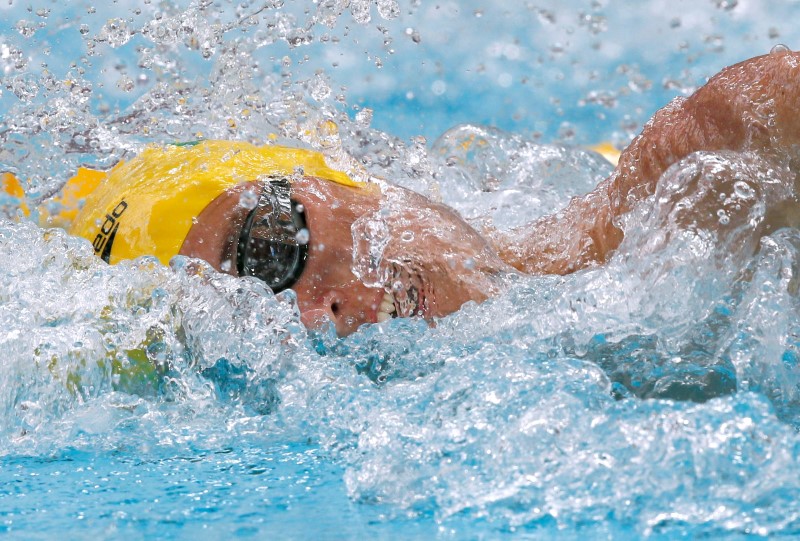By Nick Mulvenney
SYDNEY (Reuters) - No one could accuse Cameron McEvoy of lacking perspective and he might need it if he fulfils Australia's hopes of a first Olympic men's 100 metres freestyle crown since 1968 in the Rio de Janeiro pool next month.
The 22-year-old has only to ponder the fate of compatriot James Magnussen, who headed to London four years ago as favourite for gold in the blue riband sprint, to give him good reason for keeping his feet firmly on the ground.
But it is perhaps the other major passion in McEvoy's life, his study of physics, that has given him a broader outlook than many of his rivals.
Consider his take on how aliens might view competitive swimming.
"What they see is a bunch of these fully grown humans getting up on a block that's right next to a hole in the ground filled with water," the Queenslander said in an interview earlier this year.
"They dive in and they swim as fast as they can up, and then they just come right back and that's it. They would think it's just the weirdest thing they've ever seen."
While McEvoy's studies have earned him the nickname 'The Professor', his performances in the pool have made him a strong contender to bring the 100 freestyle title back to Australia for the first time since Mike Wenden won in Mexico City in 1968.
The scorching 47.04 seconds he clocked at the Australian Olympic trials in April is the fastest time of the year and the quickest since synthetic suits were banned at the end of 2009.
At the same meeting in Adelaide, he also won the 50 and 200 metres freestyle - a feat that looked set to make him the busiest swimmer in the team in Rio.
The decision earlier this month to cut the 200 metres from his schedule was a recognition he should not try and over-reach.
"We have had to take a step back and look at the bigger picture of the entire week and remember that I am only human and that I do have my limitations," he said.
Although it deprives McEvoy of a bid to become the first Australian to win six medals at a single Olympics, he will still be competing for five in the two sprints and three relays.
PUBLIC SHAMING
He made his Olympic debut in London as an 18-year-old relay swimmer, sharing in the public shaming after the scandal surrounding the team's recreational use of the sedative Stilnox and watching Magnussen's campaign from close up.
Magnussen arrived in London as favourite for 100 metres gold but ended up losing by half a finger to American Nathan Adrian and failing to anchor the 4x100 team to a medal in the relay.
Australia's campaign in London was its worst in two decades but hopes are high that McEvoy and the Campbell sisters, Cate and Bronte, can spearhead a Rio revival.
Unlike Magnussen in 2012, who revelled in the nickname Missile and warned his rivals to "brace" themselves, McEvoy has kept a low profile in the run-up to the Games.
At 70 kg and 1.85 metres - or "over 17 billion hydrogen atoms tall" as he puts it on his Instagram page - McEvoy is much smaller than the hulking Magnussen (1.98cm and 90 kgs).
"I've always been a lot smaller than my competitors throughout my career," he said recently.
What he lacks in physique, however, he makes up for with his feel for the water, a much underrated skill according to Australian swimming great Ian Thorpe.
"I think people who are very successful in swimming are those that can capture the water, they learn how the water moves and how you can move within it," Thorpe told Reuters in a recent interview.

"And with someone like Cameron McEvoy's stature, it shows those people 'I want to master the water'."